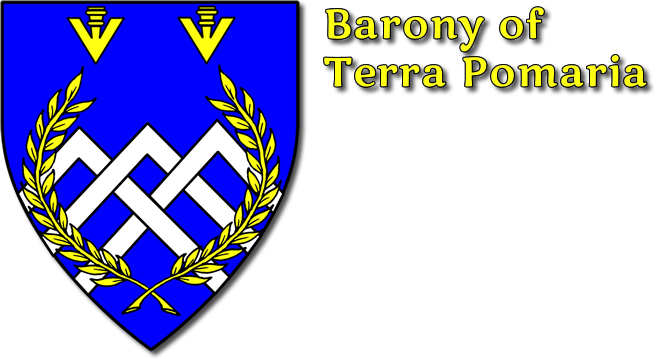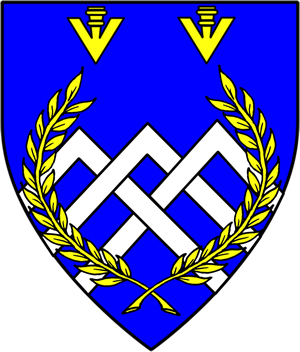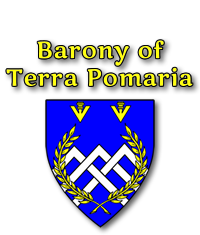01 Dec Tartes of Fleshe
Then Serve It Forth…
By Lady Rosemary Willowwood de Ste. Anne
With courteous greetings to the good folk of the Barony of Terra Pomaria, I would fain begin a new Missive, on a subject near and dear to the heart (or stomach) of each of us – that is, our meals in the Society. To the end of improving all our tables and the pleasures thereof, I would like to occasionally offer receipts from period books of cookery, with a moderate few hints on translation and realization.
“Tartes of Fleshe”
From Two Fifteenth-Century Cookery Books, Harleian Ms. 1460, Dated about 1400
Take fressh porke, hew it small, grynde it in a morter, and take it vppe into a faire vessell; And take yolkes and white of eggs, streyn hem thorgh a straynour, and temper the porke there-with; then take pynys, reysons of corance, and fry hem in fressh grece, and cast thereto pouder of peper, Gingere, Canell, Suger, Safferoun and salt, and do hit in a coffyn, and plant the coffyn above with prunes, and kutte dates and grete royayanges, and smale byrdes and or elles hard Yolkes of egges, and if thou take birdes, frey hem a littull in fresh grece, or thou putte hem into the Coffyn; then endore hit with yolkes of egges and with saffron, and let bake hit til hit be ynogh, and so serve hit forth.
TRANSLATION: Take fresh pork, hew it small, grind it in a mortar, and take it up into a fair vessel; And take yolks and white of eggs, strain them through a strainer, and temper the pork there-with; then take pine (nuts), raisins of Corinth, and fry them in fresh grease, and cast thereto powder of pepper, Ginger, Cinnamon, Sugar, Saffron and salt, and do hit in a coffin, and plant the coffin above with prunes, and cut dates and great (or grated) oranges, and small birds and or else hard Yolks of eggs, and if thou take birds, fry them a little in fresh grease, ere thou put them into the Coffin; then (glaze) it with yolks of eggs and with saffron, and let bake it until it be (done), and so serve hit forth.
REALIZATION: Chop or grind about 1 pound pork shoulder, mix in 1-2 eggs, beaten well. Lightly sauté pine nuts and raisins or currants in either butter or olive oil, season to taste with pepper, ginger, cinnamon, sugar (no more than ¼ cup), saffron and salt. Mix with the pork and layer into the bottom of a single-crust pie shell. Add a layer of chopped prunes and dates, mixed with either some grated orange peel or a few finely chopped sections of orange, if your pork is thick in texture rather than thin. Top with sliced or chunked breast of sautéed chicken. Brush the top with beaten egg and bake, about 1 hour at 375°.
GLOSSARY:
Raisins of Corinth: Dried currants such as we find in our stores, which are not true currants at all, but raising of wine-type grapes. Or, chop up regular or golden raisins.
Temper: Mix thoroughly, which will thin or lighten a mixture somewhat.
Grease: Generic term for shortening or oil. You may use anything to your taste, keeping your health in mind. Don’t be afraid of the term “white grease”, if you see it. That meant butter, not lard, which was referred to as “barrow’s grease”.
Canell: One of the many names for cinnamon. Also spelled “cannelle”, “cannel”, or as many ways as you can think to spell it, There were no dictionaries in those days!
Coffin: Medieval term for a pie crust; May be used covered (double crust) or uncovered (single crust); usually the top crust was only for keeping ashes out of the contents, and frequently was removed and thrown away rather than eaten. Being good “trenchermen”, of course, we usually eat ours.
Endore: Glaze with beaten yolks of egg, painted on with a brush or a feather. Medievals loved color, and the yolks were frequently colored with herbs, as they are here with saffron.
“Until it be enough”: “Until it is done”. There are no cooking times or oven temperatures in medieval recipes.
Faire vessell: “Faire” anything in a medieval recipe means clean or unbroken. You will see reference to “faire water”, “faire young beef”, “faire bread”, etc. Best translated as “the best ya got.”



